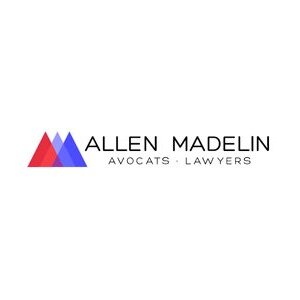Best Mining Law Lawyers in Montreal
Share your needs with us, get contacted by law firms.
Free. Takes 2 min.
List of the best lawyers in Montreal, Canada
About Mining Law in Montreal, Canada
Mining Law in Montreal, Canada, refers to the body of laws, regulations, and guidelines that govern the exploration, extraction, development, and reclamation of mineral resources within the province of Quebec, where Montreal is located. This legal field addresses various issues such as obtaining mineral rights, environmental protection, land use, indigenous rights, licensing, and compliance. Mining operations in Quebec are subject to federal and provincial laws, with a strong emphasis on sustainable development, environmental stewardship, and respecting community and indigenous interests.
Why You May Need a Lawyer
Mining is a highly regulated and complex industry. You may require the assistance of a lawyer specializing in Mining Law in various situations, including:
- Applying for mining exploration or development permits
- Negotiating or drafting joint venture or partnership agreements
- Addressing environmental compliance and assessments
- Resolving disputes with landowners, governments, or other stakeholders
- Understanding and securing mineral title rights
- Ensuring compliance with safety regulations and reporting requirements
- Dealing with indigenous consultation and land claims
- Handling mergers, acquisitions, or financing within the mining sector
- Responding to governmental investigations or enforcement actions
- Assisting in closure and reclamation of mining sites
Local Laws Overview
In Montreal, Mining Law is primarily governed by provincial legislation, notably the Quebec Mining Act (Loi sur les mines). Other relevant provincial and federal statutes include the Quebec Environment Quality Act, the Canadian Environmental Assessment Act, and various regulations concerning health, safety, and land use. Key legal considerations include:
- Obtaining exploration licenses and mining leases from the Quebec government
- Complying with environmental assessment and permitting procedures before starting significant projects
- Fulfilling obligations for public consultations with local communities and indigenous groups
- Adhering to strict environmental, health, and safety standards throughout the lifecycle of a mining project
- Submission of closure and site rehabilitation plans for approval by the relevant authorities
- Understanding royalty and tax structures imposed on mineral extraction
- Addressing the division of powers between federal and provincial governments
Frequently Asked Questions
What is required to start a mining project in Montreal, Quebec?
You need to acquire exploration licenses or mining leases from the Quebec government, undergo environmental assessments, and fulfill community and indigenous consultation requirements.
Who owns the mineral rights in Quebec?
In Quebec, mineral resources generally belong to the Crown, meaning the provincial government. There are rare private mineral rights, but most are public.
How are indigenous rights considered in mining projects?
The law mandates meaningful consultation and accommodation with indigenous communities whose traditional territories are affected by mining operations. Agreements or impact benefit agreements may be required.
Are there specific environmental requirements for mining in Quebec?
Yes, mining projects are subject to comprehensive environmental reviews under Quebec’s Environment Quality Act, requiring detailed impact assessments and mitigation measures.
How are disputes over mining rights resolved?
Disputes may be settled through negotiation, mediation, arbitration, or litigation in Quebec courts depending on the circumstances and contractual agreements.
Do mining companies need to reclaim land after mine closure?
Yes, mining companies must submit and execute closure and rehabilitation plans approved by the Ministry of Energy and Natural Resources, ensuring land is restored to an environmentally acceptable state.
Can individuals stake mineral claims in Quebec?
Individuals and companies can stake mineral claims, but must follow prescribed online staking procedures and meet ongoing reporting and work obligations to maintain those rights.
What taxes or royalties apply to mining in Quebec?
Mining operators must pay royalties to the Quebec government based on mineral production, as well as provincial and federal taxes.
How long does the permitting process take?
The timeline varies based on project complexity, environmental considerations, and consultation requirements but can range from several months to a few years.
What happens if a mining company fails to comply with laws and regulations?
Non-compliance can result in penalties, permit suspensions, fines, or legal action by regulatory bodies, as well as reputational and financial harm.
Additional Resources
For further guidance and up-to-date information on Mining Law in Montreal, Canada, consider the following resources and organizations:
- Ministry of Energy and Natural Resources of Quebec - They oversee mining regulations and licensing.
- Environmental and Climate Change Canada - For federal environmental law information.
- Canadian Institute of Mining, Metallurgy and Petroleum - Industry insights and best practices.
- Quebec Bar Association - To find qualified mining law practitioners
- Mining Association of Canada - Information on national mining standards and codes
Next Steps
If you need legal advice related to Mining Law in Montreal:
- Gather all relevant documents, such as mining claims, lease agreements, permits, and correspondence with authorities.
- Identify your main concerns or questions - whether related to rights, compliance, environmental issues, or disputes.
- Contact a lawyer who specializes in Mining Law in Quebec. Many law firms provide a free initial consultation.
- Ask about the lawyer’s experience with similar cases, fee structures, and typical timelines.
- Continue to educate yourself through reputable governmental and industry organization resources as your project progresses.
Timely legal guidance can help you navigate regulatory complexities, avoid costly mistakes, and achieve your mining objectives in accordance with local laws.
Lawzana helps you find the best lawyers and law firms in Montreal through a curated and pre-screened list of qualified legal professionals. Our platform offers rankings and detailed profiles of attorneys and law firms, allowing you to compare based on practice areas, including Mining Law, experience, and client feedback.
Each profile includes a description of the firm's areas of practice, client reviews, team members and partners, year of establishment, spoken languages, office locations, contact information, social media presence, and any published articles or resources. Most firms on our platform speak English and are experienced in both local and international legal matters.
Get a quote from top-rated law firms in Montreal, Canada — quickly, securely, and without unnecessary hassle.
Disclaimer:
The information provided on this page is for general informational purposes only and does not constitute legal advice. While we strive to ensure the accuracy and relevance of the content, legal information may change over time, and interpretations of the law can vary. You should always consult with a qualified legal professional for advice specific to your situation.
We disclaim all liability for actions taken or not taken based on the content of this page. If you believe any information is incorrect or outdated, please contact us, and we will review and update it where appropriate.











